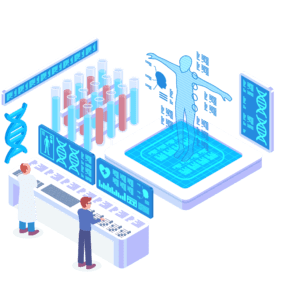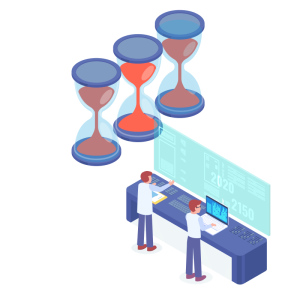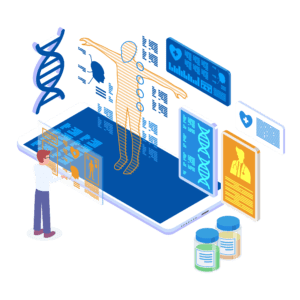Key Takeaways:
- Great Career Opportunity: Medical billing and coding is a fast-growing field in healthcare without direct patient contact.
- Important Role: Specialists handle patient data and ensure healthcare providers are paid by insurance companies.
- Flexible Work Environment: Jobs in medical coding and billing are available in various healthcare settings and can often be remote or independent.
- Education and Certification: Entry to medical coding jobs typically requires certification or an associate degree in medical billing and coding.
The best Medical Billing and Coding careers include a number of fantastic jobs in healthcare that are available and not all of them are with patients. In fact, you can be part of this thriving industry and work behind the scenes with a career in medical billing and coding. If you are looking for a rewarding career path in a fast-growing industry, then why not in the healthcare system?
Medical billing and coding is an administrative job that has grown along with the other careers in the health care industry. Since healthcare is such a huge industry there are a number of jobs with healthcare providers that are growing and at a rapid pace along with it.
Let’s take a closer look at this the position itself, how to get there and of course how to land a job in the field. As you will see medical billing and coding has the responsibility of communicating patient data to health insurance companies. So what exactly is Medical Billing and Coding?
What is Medical Billing and Coding?
If you have ever been to a doctor’s office you will be familiar with the individual who communicates with your health insurance company. This medical biller and coder ensures the healthcare provider receives payment for their services and the insurance company receives the right information for insurance claims. That information is encoded and entered into your health record. This is an easy way to keep track of your health information and to bill insurance companies for the services provided.
A healthcare claim is then processed and that is how a bill is generated. Therefore the individual in charge of medical billing and coding is responsible for running a large aspect of the office’s finances. These specialists work in a wide range of facilities including private offices, hospitals, and other healthcare-related centers. The position is typically full-time.
What Does a Medical Billing and Coding Professional Do?
In short, a medical billing and coding specialist updates a patient’s medical records. They are responsible for coding and submitting patient medical records for billing. This position is critical to ensure accurate reimbursement from insurers. Additionally, they analyze patient data and ensure the insurance companies are appropriately billed according to the results of that data.
Many medical offices have made the transition away from paper today to electronic data. It is important for a medical billing and coding specialist to have familiarity using computers. Some offices still use a paper system but many utilize some combination of the two. A number of offices will rely on you to help them make the transition away from paper to electronic filing. It is essential that you are able to remain flexible and have knowledge of up-to-date filing systems.
Another of the job responsibilities is to cross check and ensure that data received is up-to-date and accurately recorded for each patient and client in the healthcare setting. Accurate data ensures that insurers are able to reimburse and process claims effectively.
Perhaps the biggest skill required is that the individual has accurate knowledge of systems and how medical information is classified. You must have an understanding of codes and how information is classified and categorized per patient. Fortunately, these codes are universal.
What is HIPAA Compliance?
A big issue that has arisen lately with regards to electronic medical data is the issue of security. When it comes to ethics a medical billing and coding specialist must maintain patient confidentiality. Data should remain safe and secure. Data must be HIPAA compliant.
HIPAA or the Health Insurance Portability Accountability Act was signed into law in 1996. The goal is to protect individuals from fraud and theft as information is gathered and transferred.
There are 5 titles and the second title is the most relevant to medical billing and coding. Title II deals with “preventing medical healthcare fraud and abuse, administrative simplification and liability.” Patients have a right to privacy regarding their conditions, where they have received treatment and any and all fees paid by the individual.
Medical Billing and Coding Day-to-Day Duties
We discussed that much of what medical billers and coders do is to create a streamlined system that files and categorizes patient information. Additionally it is the responsibility of the specialist to ensure that patient data is safe and secured. Let’s take a look at some of the various duties to give you a better picture of a day in the life of a coding specialist.
- Organize Office Data
- Check Medical Records Data For Accuracy
- Update Data
- Input clinical Codes to Obtain Reimbursement from Insurance Companies
- Analyze patient data
- Review medical records
- Check for Errors and Ensure that Correct Codes are Used
- Communicate with insurance provider where necessary
- Secure Patient Data
Where Do Medical Billers and Coders Work?
A medical biller and coder typically works in a health care setting and other facilities where the business bills for medical services rendered. These locations may include doctor’s offices, clinics, hospitals, healthcare agencies, insurance companies, and also medical supply companies. Additionally, many professionals choose to work as an independent contractor for a medical facility of their choice. And there are also many opportunities to work remotely.
According to the BLS, Medical Records Specialists hold around 186,000 jobs nationwide. Below are the largest employers of medical records specialists in the US.
| Employer | Percent |
|---|---|
| Hospitals | 29% |
| Physician’s Offices | 19% |
| Professional, Scientific, and Technical Services | 9% |
| Administrative and Support Services | 7% |
| Nursing and Residential Care Facilities | 5% |
How Do You Become a Medical Biller or Medical Coder?
Are ready to start your new career in medical billing and coding but are unsure how to proceed. Lately it seems like you need a certification to do just about everything. That is the trend for medical billing and coding. While you can find a job and learn on-the-job you are likely going to need to take a few courses or complete a degree in medical billing and coding.
You can choose to complete a professional certification course or an associate degree program. Because these positions require technicians assign a code to match a medical diagnosis, you should look for specific programs. This means that you will either want to complete an American Health Information Management Association (AHIMA) approved coding program, an American Academy of Professional Coders (AAPC) approved coding program, or an associate degree in health information management or related field.
Before applying for a degree, check around for job listings in your area. Read through the qualifications section and determine what you will likely need to land a job in your area. Check also for on-the-job training opportunities. The American Academy of Professional Coders (AAPC) offers a number of certification courses that are much faster than a degree and likely will be enough to help you land an entry-level job. If you are looking to advance your career you can then consider an associate’s or even a bachelor’ degree.
Associate Degree in Health Information Management
If you are looking for a CAHIIM-accredited program there are several online associate’s degrees available in the field of health information management. The programs typically require about two years to complete or 60-65 credit hours of course material. Here’s a quick glance at what you will be studying in an associate’s-level program.
- Introduction to Healthcare Information Systems
- Principles of Health Information Management
- Fundamentals of Healthcare Law and Ethics for Health Information Professionals
- Anatomy and Physiology
- Information Technology and Data Management
- Health Information Management and Leadership
- Health Sciences
- Diagnostic Coding
- Procedural Coding
- Foundations of Classification, Compliance and Reimbursement
- Medical Law
- Foundations of Healthcare Quality
- Pathophysiology and Pharmacology
Most programs offer all or some combination of the above courses and the core learning courses typically include a course on insurance claim procedures, international classifications of disease (ICD) medical office technology and administration, medical terminology, and any related coding class.
AAPC Certifications

Another path to a coding career is to earn a medical coding certification from the American Academy of Professional Coders (AAPC). Having a medical coding certification shows employers you know the job and have the skills to do it. Additionally, a certification can increase you average annual salary in this high demand field! And professionals with three certifications can increase their salary by as much as $10,000 per year.
Medical Biller Training & Education (more)
- CPB: Certified Professional Biller. The most recognized certification for medical billers.
Medical Coding specialist Training & Education (more)
- CPC: Certified Professional Coder. The most recognized certification for medical coders.
- COC: Certified Outpatient Coder. Rapidly Growing for Emergency Departments and Other Outpatient Facilities
- CIC: Certified Inpatient Coder. A specific niche of coding used in inpatient facilities.
- Certified Risk Adjustment Coder: This individual is highly skilled and able to read medical charts.
- Specialty Certifications: There are numerous specialized certifications for experienced coders.
There are many more certifications out there. We recommend checking with your future employer to determine what is necessary.
How long does it take to earn a medical billing and coding certification?
The time it takes to earn a medical billing and coding certification vary widely depending on the type of program you enroll in and the amount of time you can dedicate to the course. Some programs allow you to complete your certification and begin working in as little as six months, while others can take up to two years or longer.
Medical Billing and Coding Soft Skills
In this profession, you should be able to meticulously follow instructions, be comfortable using technology, and maintain patient privacy and confidentiality.
- Dependable and Punctual
- Good Problem-solver with Troubleshooting Skills
- Effective Communication With Patients and Insurance Companies
- Team Player and Willing to Learn
- Detail Oriented and Organized
- Patient
Job Outlook For Medical Coding and Billing

According to the Bureau of Labor Statistics (BLS), medical billing and coding jobs are projected to grow at an average rate of 7% over the next decade. By comparison, the average position grows at about the same rate, so the job outlook is good for this profession.
Health care is a large industry with jobs continually increasing and often at a rapid pace. Medical Billing and Coding jobs are increasing at pace with the national average and a reverse trend compared to positions in other industries. The health care industry is different from others as trends and life expectancies are changing rapidly.
Additionally, there are new technologies in offices that require better trained individuals to run them. This is unlike other secretarial positions where technology actually has caused a decline in trends. The good news about learning medical billing and coding is that you have a much increased likelihood of securing a job and keeping a job years down the road.
What is the Salary of a Medical Billing and Coding Specialist?
According to the Bureau of Labor Statistics (BLS), the median annual wage for a Medical Records Specialist is $46,660. Like with most positions, geographic location, education, work experience, and employer all influence earnings. Below are the the top industries for medical records specialists and the median annual wages. Hospitals are the largest and also one of the highest paying employers.
Obtaining a CPC certification may increase an average annual salary by 10%. However, it is important to check with employers ahead of time to determine whether or not a certification is required.
| Top Industries | Salary |
|---|---|
| Professional, scientific, and technical services | $47,000 |
| Hospitals; state, local, and private | $47,000 |
| Administrative and support services | $46,900 |
| Nursing and residential care facilities | $37,740 |
| Offices of physicians | $37,330 |
Do You Match The Job Quick Glance
While there are obviously a number of personalities that excel in medical billing and coding roles, below are some of the most common personality and skill-related traits that excellent medical billing and coding professionals share.
- Detail Oriented
- Patient and Calm
- Friendly and Can Communicates With Many Types of People
- Sharp on a Computer
Profile of a Medical Billing Professional
When it comes to a career as a medical billing and coding specialist, it may be true that you possess the knowledge but is that enough to determine whether or not you are a good fit.
A medical billing and coding professional is an individual who is well organized and a great communicator. As this is a public-facing position it is important for the individual to present with a positive demeanor and to be able to communicate clearly with patients and clients.
The person in this position must be comfortable spending multiple hours a day working at a desk and sitting at a computer as the majority of this position requires time filing paperwork electronically and inputting codes.
Like with all positions it is important for the individual to be able to troubleshoot problems so any individual looking to pursue a career as a medical billing and coding specialist will be patient and positive. Things are going to go wrong where insurance is concerned and it will be your job to maintain a professional demeanor despite problems and issues.
This person will need to pay attention to detail to ensure they input information accurately and effectively.
An ability to speak to a variety of people is important as the medical billing and coding specialist will speak to physicians, patients, and insurance companies regularly throughout the day.
Jobs Related to Medical Coding and Billing
There are many job opportunities in the healthcare field. A number of these jobs have overlap or are identical to a job as a medical billing and coding specialist.
- Reimbursement and Coding Specialist
- Certified Medical Biller
- Medical Coder
- Health Information Specialist
- Health Information Technician
- Medical Secretary
- Medical Records Receptionist
- Medical Billing Clerk
- Diagnostic Radiology Coder
- Medical Coding Auditor
- Medical Records Analyst
Should You Take Online Courses in Medical Billing and Coding?
There are a number of reasons to head back to school to study medical billing and coding. Online education is far different from studying in-person and may be a great fit. On the other hand, online education is not for everyone. Here’s a quick look at whether or not an online certificate or degree in medical billing and coding may or may not be right for you.
Online Degree Pros
- Fast- online degrees offer shorter semesters which makes for an accelerated overall pace.
- Affordable- as you spend fewer years in school, online degrees are often more affordable than programs taken in person
- Convenient- for many working professionals an online degree is the only way they can fit school into their busy schedule.
- Flexible- you can pursue your online degree anywhere and at any time.
Online Degree Cons
- Less Social- You will learn the material but not in the presence of peers or others with similar interests
- Less time with a professor- it can be difficult to schedule time with a professor as it is and often times is much more difficult when you are taking an online class
- Unless you’re self-driven can be difficult to get motivated
- Not Great for Hands-on Learning unless the program requires a practicum
What to Ask Before Beginning an Online Program
- How Much Free Time Do I Have?
- Is This The Only Barrier to Entry to this Job?
- Is this the right degree for me?
- Do I have Funding to Cover the Program and the Time Spent on it?
- Will This Program Prepare Me for a Career in the Field?
- Is this Program Accredited?
- How Long Will it Take to Complete This Program?
If you don’t have a positive response to each question that is okay. Sometimes it will still be necessary to begin a program in medical billing and coding. These courses and certifications won’t last forever but your career will help to carry you through to success in your life. It may be necessary to take the time to complete a medical billing and coding degree.
Technological Skills Necessary for Medical Billing and Coding Technicians
- Coding Software
- Accounting Software
- Accurate Data Entry
- Medical Software
- Word Processing Software
- ICD20 Consult
- STAT ICD-10 Coder
Additionally it is important for the coder to know the piece of software that matches their role. Specific certifications available through the AAPC will help you to learn the software necessary on the job.
How Long Does it Take to Become a Medical Billing and Coding Technician?

Your program of choice and the amount of free time you have to devote to the pursuit will determine the pace of learning. Generally speaking, however if you choose to pursue a certification in medical billing those certification will take less than a year to complete.
An associate’s degree will take about 2 years to complete from start to finish. Should you choose to pursue a bachelor’s degree in health informatics, that will typically take about 4 years to complete.
The CPC certification does require some work experience to obtain which may be completed on the job.
Quick Guide to Become a Medical Coder
We hope you have gleaned enough information from this piece on what you can do with a medical billing and coding degree. The job continues to grow and with the right certification continues to grow in pay. This is an excellent choice for a career in the healthcare industry. To sum things up we created this quick reference guide.
- One: Use research to determine which jobs are available in your area. A quick job search will reveal which certification programs to enroll in.
- Two: Do a little soul-searching to determine if you would be a good fit for this career. Thinks like: do I like talking to the public and am I obsessed with detail? Are important areas to explore.
- Three: Determine if you wish to pursue certification in person online or not at all.
- Four: Initiate your course in medical billing and coding
- Five: Complete and pass your certification examination
- Six: Polish up your resume and start applying to positions
- Seven: Interview for jobs and start your career!
That is really it! Medical billing and coding is a fantastic option for any individual looking for a growing job in the field of healthcare.
Career Advancement
Medical records specialists may advance their career with an bachelor’s degree. Typical career paths include health information technologists or medical registrars or medical or health services managers after completing a higher certification program or earning a degree in health information technology.
Related:
- 10 Accelerated Medical Billing and Coding Programs
- 15 Best Online Medical Billing and Coding Associate’s Degrees
- 25 Best Associate Degree in Medical Billing and Coding Systems
- The 10 Fastest Online Masters Human Services Programs
- 25 Best Human Services Bachelor’s
- 15 Best Human Services Bachelor’s Online Programs
- 10 Fastest Online MBA Healthcare Management Degree Programs
